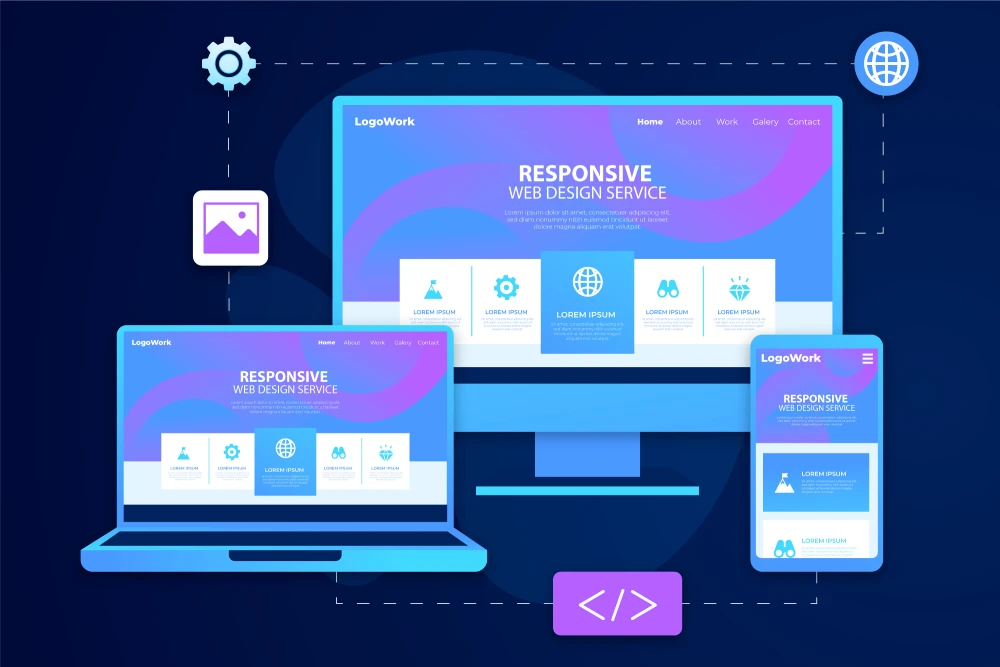
In today's world, having a website that looks great on any device is essential for businesses of all sizes. Since so many people use their phones to access the internet, it's important to make sure your website is optimised for mobile use. This is where a web design agency comes in. In this article, we will explore what a web design agency is, why you need one, and how to choose the right one for your business. We'll also provide tips on how to create a website that looks great on any device.
Table of Contents
- Introduction
- What is a web design agency?
- Why Do You Need a Web Design Agency?
- Benefits of Hiring a Web Design Agency
- How to Choose the Right Web Design Agency
- Tips for Creating a Website That Looks Great on Any Device
- The importance of mobile optimisation for websites
- Best Practises for Mobile Website Design
- Responsive Design vs. Mobile-First Design
- Common Mistakes to Avoid in Mobile Website Design
- Factors that Affect Mobile Website Design
- The Role of SEO in Mobile Website Design
- Conclusion
- FAQs
Introduction
In today's digital age, having a website that is mobile-friendly is no longer an option. With the number of mobile users on the rise, businesses need to make sure their websites are mobile-friendly. This is where a web design agency comes in. A web design agency is a team of professionals who specialise in creating websites that are not only visually appealing but also optimised for mobile use.
What is a web design agency?
A web design agency is a company that specialises in creating and designing websites. They work with businesses to create websites that are visually appealing, user-friendly, and optimised for mobile use. A web design agency typically consists of web designers, developers, and other professionals who work together to create a website that meets the client's needs.
Why Do You Need a Web Design Agency?
There are several reasons why you need a web design agency. First, they have the expertise and experience to create a website that meets your specific needs. They can help you create a website that is visually appealing, user-friendly, and optimised for mobile use. Second, they can save you time and money by handling all aspects of your website's design and development. Finally, they can help you stay up-to-date with the latest trends and technologies in web design.
Benefits of Hiring a Web Design Agency
Hiring a web design agency has several benefits, including:
-
Expertise and Experience: Web design agencies have the expertise and experience to create a website that meets your specific needs.
-
Saves Time and Money: A web design agency can save you time and money by handling all aspects of your website's design and development.
-
Stay Up-to-Date: A web design agency can help you stay up-to-date with the latest trends and technologies in web design.
How to Choose the Right Web Design Agency
Choosing the right web design agency is crucial to the success of your website. Here are some tips for choosing the right web design agency:
-
Look at their portfolio: Look at the agency's portfolio to get an idea of their design style and the types of websites they have created.
-
Check their reviews: Check the agency's reviews to see what their clients have to say about their work.
-
Consider their expertise: Consider the agency's expertise and experience in web design, development, and mobile optimisation.
-
Look at their pricing: Look at the agency's pricing to ensure that it fits within your budget.
Tips for Creating a Website that Looks Great on Any Device
Creating a website that looks great on any device is crucial for the success of your business. Here are some tips for creating a website that looks great on any device:
Choose a Responsive Design
Choosing a responsive design is one of the best ways to ensure that your website looks great on any device. A responsive design allows your website to adapt to different screen sizes, ensuring that it looks great on desktops, laptops, tablets, and mobile devices.
Use a mobile-first approach.
Using a mobile-first approach means designing your website for mobile devices first, then scaling it up for larger devices. This approach ensures that your website is optimised for mobile use, which is essential since more people are accessing the internet on their mobile devices than ever before.
Optimise your images
It's important to optimise your images to make sure that your site loads quickly on all devices. Large images can make it take longer for your website to load, which can hurt your users' experience.
Use clear and readable fonts.
For your website to be easy to read on any device, you need to use fonts that are clear and easy to read. Choose fonts that are easy to read on small screens, and ensure that the font size is large enough to be read on mobile devices.
Use Simple Navigation
It's important to use simple navigation to make sure your website is easy to use on any device. Use a simple and intuitive navigation menu that allows users to quickly and easily find what they are looking for.
Test Your Website on Multiple Devices
Testing your website on multiple devices is important for ensuring that it looks great and works properly on all devices. Test your website on different devices and screen sizes to ensure that it looks great and functions properly.
Importance of Mobile Optimisation for Websites
Mobile optimisation is crucial for the success of your website. More people are accessing the internet on their mobile devices than ever before, which means that having a website that is optimised for mobile use is essential. Mobile optimisation ensures that your website is easy to use on mobile devices and that it loads quickly.
Best Practises for Mobile Website Design
Here are some best practises for mobile website design:
- Use a responsive design.
- Use clear and readable fonts.
- Use simple navigation.
- Optimise your images.
- Use white space to create a clean and uncluttered design.
- Use a colour scheme that is easy on the eyes.
- Keep your content concise and to the point.
Responsive Design vs. Mobile-First Design
Responsive design and mobile-first design are two different approaches to creating a website that looks great on any device. Responsive design means making a website that fits different screen sizes, while mobile-first design means making a website for small screens first and then making it bigger for bigger screens.
Common Mistakes to Avoid in Mobile Website Design
Here are some common mistakes to avoid in mobile website design:
- not using a responsive design
- Using small font sizes that are difficult to read on mobile devices
- Using too many images, which can slow down your website's loading time
- Using a complicated navigation menu
- Not testing your website on multiple devices
Factors that Affect Mobile Website Design
Several factors can affect mobile website design, including:
- Screen size
- User behaviour
- Mobile network speed
- Device capabilities
- Mobile browser compatibility
The Role of SEO in Mobile Website Design
SEO plays a crucial role in mobile website design. Optimising your website for search engines ensures that it ranks higher in search engine results, which can drive more traffic to your website.
- Using a responsive design
- Optimising your images for mobile use
- Using clear and concise content
- Using meta tags and descriptions
- Optimising your website for local search
- Using schema markup
Conclusion
In today's world, having a website that looks great on any device is essential for the success of your business. A web design agency can help you create a website that is visually appealing, user-friendly, and optimised for mobile use. By following the tips outlined in this article, you can ensure that your website looks great on any device and provides a positive user experience.
FAQs
1. What is a web design agency?
A web design agency is a company that specialises in creating and designing websites.
2. Why do I need a web design agency?
A web design agency can help you create a website that is visually appealing, user-friendly, and optimised for mobile use.
3. What is responsive design?
A responsive design is a way of making a website that lets it change to fit different screen sizes.
4. Why is mobile optimisation important for websites?
Websites need to be optimised for mobile devices because more people are using their phones and tablets to access the internet than ever before.
5. What are some SEO best practises for mobile website design?
Some of the best SEO practises for designing a mobile website are to use a responsive design, optimise your images for mobile use, and write content that is clear and to the point.



Maneesh Kumar
As a multi-talented professional, I have experience as a software developer, digital marketer, SEO specialist, and content creator. Throughout my career, I have completed various projects that have enhanced my skills and knowledge in the IT field. With over six years of experience, I am well-equipped to tackle any challenge that comes my way.